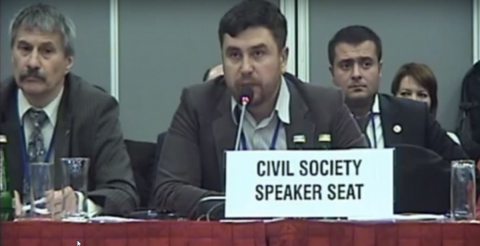Andrei Paluda: It's time to introduce a moratorium on the death penalty in Belarus
-

- Andrei Paluda speaking at an OSCE Human Dimension conference. September 25, 2015.
On September 25, the OSCE Human Dimension Conference in Warsaw hosted an exchange of views on the abolition of the death penalty.
The main issues discussed at the event were:
- additional measures that can be taken to inform the public about the death penalty and support the discussion of this issue in society;
- measures aimed at abolishing the death penalty and the introduction of humane types of punishment that are exercised in those states where the death penalty is retained;
- legislative and practical measures to be taken to preserve the international legal and other obligations regarding the use of the death penalty.
In his speech at the meeting, the coordinator of the campaign “Human Rights Defenders Against the Death Penalty in Belarus” Andrei Paluda told in detail about the situation with the issuance and enforcement of the death penalty in Belarus.
“Despite certain reduction in the number of death sentences in Belarus since 1999, our country continues to issue and enforce them. Belarus is in fact the last country in Europe and the former Soviet Union, in which the death penalty is applied in practice. In particular, there has been a death sentence this year. Information on the application of the death penalty is under a veil of secrecy and is virtually closed to the public. In fact, there is no information on the number of executions. Government-controlled media and officials say only about the number of death sentences, which contradicts the obligations of Belarus as an OSCE member. According to estimates of the HRC "Viasna", in the period of Belarus’ independence the country has executed 400 people. It is impossible to announce the exact figure today for several reasons. Firstly, any information on the enforcement of death sentences is classified. As before, according to the rules of criminal procedure legislation, the bodies are not given to relatives, just like their personal belongings; the time and place of burial is not disclosed, which in turn leads to the suffering of the victims’ relatives.”
Andrei Paluda also recalled that in October 1999 the UN Human Rights Committee found in the case Belarus v. Bandarenka that such state actions are inhuman treatment in respect of the prisoners’ relatives. As yet, the above decision of the Committee has not been implemented, the mother does not know where her son is buried, and the Code of Criminal Procedure has not been amended.
Attempts to calculate the number of executions as compared to the number of death sentences are yet far from being successful, as during the collapse of the USSR the independent Republic of Belarus received a legacy of death convicts, who had not been yet executed. As an example, the human rights activist cited the fact that in death convicts were transferred to Minsk from the neighboring Lithuania, which began in 1962 and lasted up until the independence of the two countries.
Among other things, the representative of the Human Rights Center “Viasna” stressed that Belarus continuously violated international standards and agreements concerning complaints submitted to the United Nations Human Rights Committee.
“The convicts are executed, despite temporary protection measures, under which the sentence shall not be executed until the corresponding communication is considered by the Committee. In particular, in seven cases, death sentences were executed prior to the consideration of individual complaints submitted to the UN Human Rights Committee. Thus, we can talk about the violation by Belarus of special procedures. At the moment, the Human Rights Committee has considered five individual complaints submitted by persons sentenced to death in Belarus. In all of them, the Committee has found violations of articles of the International Covenant on Civil and Political Rights. We believe that it’s time to introduce a moratorium on the death penalty in Belarus as a first step towards its total abolition.”
Fifty-one OSCE participating states have abolished the death penalty for all crimes, with four having abolished the death penalty de facto, and two, including Belarus, retaining the death penalty.

